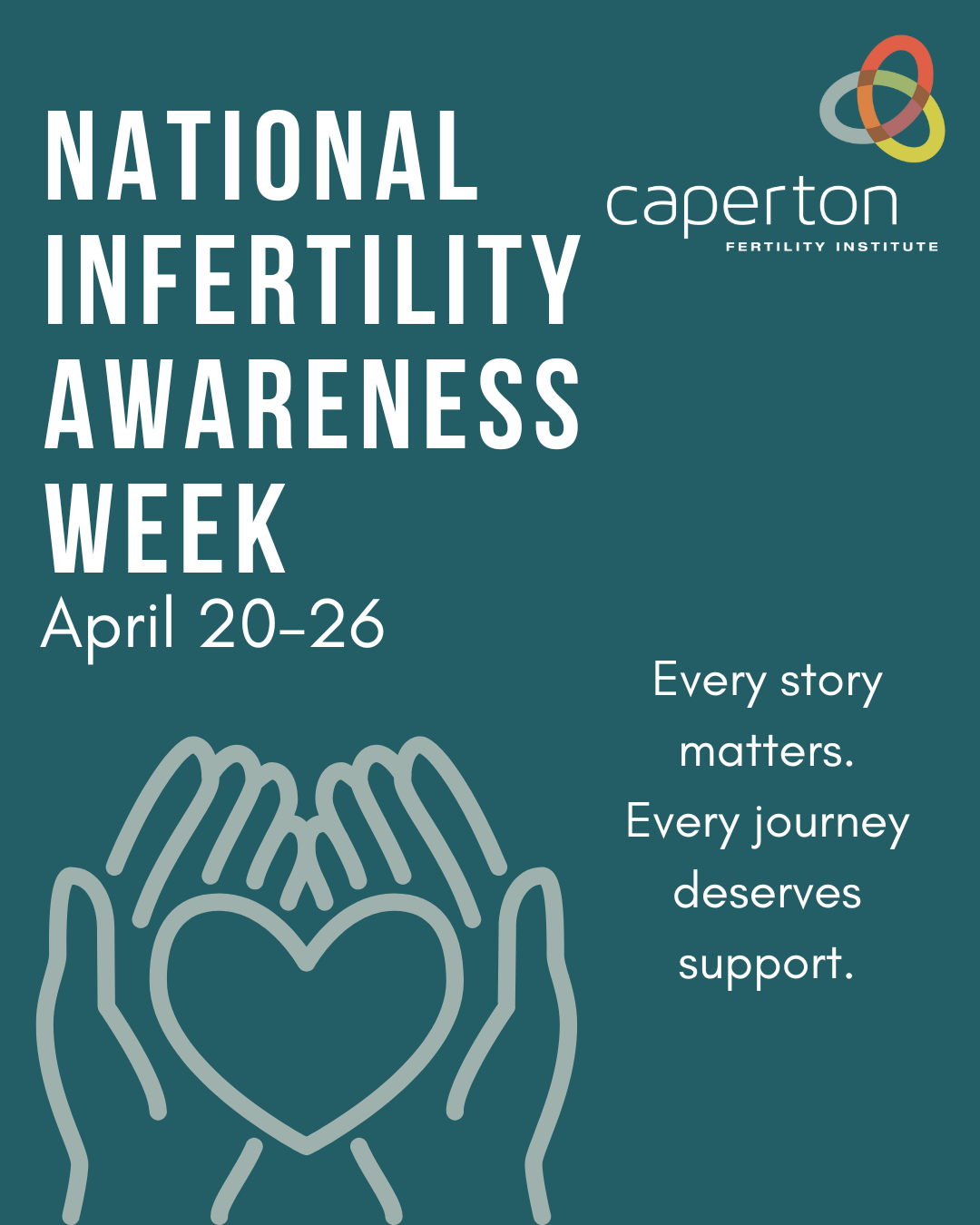National Infertility Awareness Week 2025: Breaking the Silence, Offering Hope
Caperton Fertility Institue • April 8, 2025
April 20–26, 2025 marks National Infertility Awareness Week (NIAW)—a time to shine a compassionate spotlight on a journey that affects 1 in 8 couples. At Caperton Fertility Institute, serving families in Albuquerque, NM, and El Paso, TX, we believe in replacing silence with support, isolation with community, and confusion with answers. This week, we stand with every individual and couple walking the path of infertility—because no one should have to walk it alone.

Why National Infertility Awareness Week Matters
Infertility isn't rare—but it’s rarely talked about. NIAW, led by RESOLVE: The National Infertility Association, exists to:
- Break the stigma around infertility.
- Educate the public about reproductive health.
- Empower those struggling with infertility to speak up and seek support.
- Advocate for access to care and fertility benefits.
Each year, this week reminds us that behind every statistic is a story—and every story deserves to be heard.
Infertility Facts You Should Know
- 1 in 8 couples in the U.S. struggle to conceive or carry a pregnancy to term.
- 1 in 4 pregnancies end in miscarriage.
- Infertility affects men and women equally—about 30% male factor, 30% female factor, and 40% a combination or unexplained.
- Most people wait more than a year before seeking help—even though early intervention increases success rates.
- The emotional impacts of infertility can mirror chronic illness and grief, affecting mental health and relationships.
At Caperton Fertility Institute, we’re here to change the narrative. We provide advanced, compassionate care backed by science—and shaped by understanding.
Infertility FAQ: What People Are Afraid to Ask (But Should)
How do I know if I’m infertile?
If you've been trying to conceive for 12 months (or 6 months if you're over 35) without success, it may be time to talk to a fertility specialist.
Does infertility only affect women?
Not at all. Male fertility plays a role in nearly half of all infertility cases. That’s why our evaluations always include both partners.
Is IVF my only option?
IVF is just one of many fertility treatments. Depending on your situation, options might include ovulation induction, IUI (intrauterine insemination), lifestyle changes, or surgical interventions. We tailor every plan to your unique needs.
Is infertility treatable?
In many cases, yes. With today’s technology and expert care, up to 90% of infertility cases can be treated. Caperton Fertility Institute offers some of the highest success rates in the Southwest.
How to Support Someone Struggling With Infertility
If someone you care about is going through infertility, here’s how to be there for them:
- Listen without offering advice.
- Avoid saying things like “Just relax,” or “At least you know you can get pregnant.”
- Ask, “How can I support you right now?”
- Respect their privacy—but let them know you’re a safe space if they want to talk.
- Join them in raising awareness during NIAW. Sharing educational content or attending events together can mean the world.
Let’s Talk About It—Together
At Caperton Fertility Institute, we’re using National Infertility Awareness Week as a chance to not only educate, but to empower. Whether you’re just beginning to explore your fertility or you’ve been on this journey for years, you deserve answers, support, and hope.
We invite you to:
- Schedule a consultation with our expert fertility team.
- Follow us on social media for educational resources, patient stories, and NIAW highlights.
- Share your story—because speaking up changes everything.
Proudly Serving Albuquerque, El Paso & Beyond
With cutting-edge technology, individualized treatment plans, and an award-winning team of fertility specialists, Caperton Fertility Institute is proud to support patients in New Mexico, West Texas, and beyond. During National Infertility Awareness Week—and every day—we’re here to help you take the next step toward the family you’ve been dreaming of.
Ready to Start the Conversation? Let’s turn awareness into action.

When people talk about IVF, the focus is often on the medical side—medications, timelines, lab work, and success rates. What’s discussed far less often is the emotional experience , which can be just as intense as the physical process. If you’re feeling overwhelmed, conflicted, hopeful one moment and discouraged the next, you’re not doing IVF “wrong.” These emotional shifts are common—and normal. Here’s what many patients experience emotionally during IVF, even if no one warned them ahead of time. The Emotional Whiplash of Hope and Fear IVF often brings a unique combination of optimism and anxiety. Starting treatment can feel empowering—finally, something is happening. At the same time, that hope may feel fragile, especially if you’ve experienced infertility, loss, or disappointment before. Many patients describe: Feeling excited and terrified at the same time Guarding their optimism to avoid heartbreak Struggling to plan for the future because outcomes feel uncertain This emotional push and pull can be exhausting, and it’s one of the most common aspects of IVF that people don’t expect. Loss of Control (and Why It’s So Hard) IVF places much of the process outside your control—medication schedules, hormone levels, test results, and timing are often dictated by your body and the clinic. Even highly organized, resilient people may feel: Frustrated by last-minute changes Anxious while waiting for updates or phone calls Disconnected from their own body Feeling out of control can be one of the most emotionally challenging parts of IVF, especially for patients used to being proactive problem-solvers. The Two-Week Wait: An Emotional Rollercoaster The time between embryo transfer and pregnancy testing—often called the two-week wait—is widely considered the most emotionally difficult phase of IVF. During this time, patients may experience: Hyper-awareness of every physical sensation Replaying every step of the cycle in their mind Mood swings between confidence and despair Fear of testing too early—or testing at all This waiting period can feel isolating and all-consuming, even when everything medically has gone well. Unexpected Grief (Even During Treatment) IVF can bring up grief in unexpected ways—not just if a cycle fails, but throughout the process. You might grieve: The loss of a “normal” conception experience The version of parenthood you imagined Feeling carefree about pregnancy announcements or baby showers Even successful cycles don’t erase this grief. Many patients feel guilty for mourning while still feeling hopeful—but both emotions can exist at the same time. Relationship Strain and Emotional Distance IVF can impact relationships in ways couples don’t anticipate. Partners may cope differently—one may want to talk constantly, while the other withdraws. Common experiences include: Feeling emotionally out of sync with your partner Pressure to stay “strong” for each other Misunderstandings fueled by stress and fatigue Open communication and compassion—for yourself and your partner—are essential during treatment. You Are Not Weak for Feeling This Way One of the hardest emotional burdens of IVF is the belief that you should be handling it better. Many patients silently wonder why they feel so overwhelmed. The truth is: IVF is emotionally demanding . Feeling anxious, sad, angry, numb, or hopeful—sometimes all in the same day—does not mean you’re failing. It means you’re human. Supporting Your Emotional Well-Being During IVF While you can’t eliminate the emotional challenges of IVF, support can make a meaningful difference. Many patients benefit from: Counseling or fertility-focused therapy Support groups or trusted friends Mindfulness, journaling, or gentle movement Setting boundaries around social media and conversations Most importantly, give yourself permission to feel what you feel—without judgment. You Don’t Have to Carry This Alone IVF is more than a medical treatment; it’s an emotional journey that deserves understanding and compassion. If you’re struggling emotionally during IVF, know that you are not alone—and support is available. Your feelings are valid. Your experience matters. And taking care of your emotional health is just as important as every injection, appointment, and lab result along the way.

February is best known for hearts—whether it’s Valentine’s Day cards or American Heart Month. But beyond the decorations and candy, February is an important reminder to talk about heart health , and for individuals and couples trying to conceive, that conversation matters more than many people realize. Your heart and reproductive system are deeply connected. Taking care of your cardiovascular health can play a meaningful role in fertility, pregnancy outcomes, and even IVF success. How Heart Health Impacts Fertility The cardiovascular system is responsible for delivering oxygen and nutrients throughout the body—including to the reproductive organs. When heart health is compromised, blood flow can be affected, which may influence hormone balance, egg and sperm quality, and overall reproductive function. Conditions such as: High blood pressure Diabetes Obesity Elevated cholesterol can all impact fertility in both women and men. These conditions may also increase the risk of pregnancy complications, making heart health important not just for conception, but for a healthy pregnancy as well. Heart Health and Female Fertility In women, cardiovascular health is closely tied to hormonal regulation and ovulation. Poor circulation and chronic inflammation can interfere with: Regular ovulation Endometrial lining development Egg quality Additionally, conditions like polycystic ovary syndrome (PCOS) are often associated with insulin resistance and cardiovascular risk factors, highlighting the overlap between heart health and reproductive health. Heart Health and Male Fertility Heart health matters just as much for male fertility. Research has shown that men with cardiovascular risk factors may experience: Lower sperm count Reduced sperm motility Increased DNA fragmentation Lifestyle habits that support heart health—such as regular exercise, balanced nutrition, and avoiding tobacco—are often the same habits that support healthy sperm production. IVF, Pregnancy, and Cardiovascular Wellness For patients undergoing IVF, optimizing overall health before treatment can improve outcomes and reduce risks. A healthy cardiovascular system supports: Better response to fertility medications Improved uterine blood flow Lower risk of pregnancy-related complications such as preeclampsia or gestational hypertension That’s why fertility specialists often emphasize wellness and lifestyle optimization as part of fertility care. Simple Heart-Healthy Habits That Support Fertility The good news? You don’t need perfection—small, consistent changes can make a difference. Some heart-healthy habits that also support fertility include: Engaging in moderate physical activity most days of the week Eating a balanced diet rich in fruits, vegetables, lean proteins, and healthy fats Managing stress through mindfulness, therapy, or relaxation techniques Getting adequate sleep Avoiding smoking and limiting alcohol intake These steps benefit not only your heart, but your reproductive health as well. February: A Month to Focus on the Whole You Fertility care isn’t just about lab results or treatment cycles—it’s about supporting the whole person. February is the perfect time to reflect on how heart health fits into your fertility journey and to remember that caring for yourself now can have long-term benefits for your future family. If you’re trying to conceive, thinking about IVF, or simply have questions about how your overall health may impact fertility, a fertility specialist can help guide you with personalized care and evidence-based recommendations. Your heart—and your future—deserve that care. 💙

